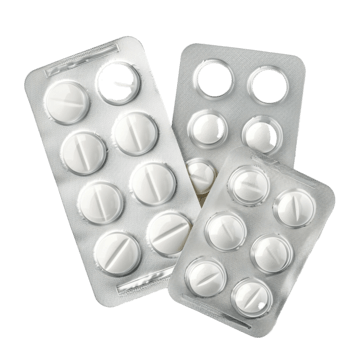Ibuprofen

Ibuprofen 200mg, 400mg, 600mg, 800mg
Ibuprofen is a nonsteroidal anti-inflammatory drug (NSAID) commonly used to relieve pain, reduce inflammation, and lower fever. It works by inhibiting the production of prostaglandins, substances in the body that mediate pain and inflammation. Ibuprofen is often taken for various conditions, including headaches, muscle aches, arthritis, and menstrual cramps, providing effective symptom relief for many individuals.
Order NowDescription
Ibuprofen is a nonsteroidal anti-inflammatory drug (NSAID) that helps reduce fever, pain, and inflammation. It works by inhibiting the production of prostaglandins, chemicals in the body that promote inflammation and pain. Ibuprofen is commonly used for a variety of conditions, providing effective relief for various types of discomfort.
Uses / Indications
- Mild to moderate pain relief (headaches, toothaches, menstrual cramps, muscle aches)
- Reduction of fever
- Management of inflammation (arthritis, sprains, strains)
- Post-operative pain relief
- Pain relief in conditions such as osteoarthritis and rheumatoid arthritis
Dosage and Administration
Adults:
200 to 400 mg every 4 to 6 hours as needed (maximum 1200 mg per day for over-the-counter use).
Children (6 months to 11 years):
Dosage is based on the child’s weight and age. Consult with a healthcare provider for precise dosing guidance.
Note: Dosage may vary based on medical condition or doctor’s advice.
How It Works (Mechanism of Action)
Ibuprofen works by inhibiting the enzymes called cyclooxygenases (COX-1 and COX-2), which are involved in the synthesis of prostaglandins. By reducing the levels of these chemicals, ibuprofen effectively diminishes inflammation, pain, and fever.
Side Effects
Common side effects:
- Nausea or vomiting
- Stomach upset or pain
- Headache
- Dizziness
Rare/serious side effects:
- Gastrointestinal bleeding (black or bloody stools)
- Severe allergic reactions (rash, itching, difficulty breathing)
- Kidney issues (reduced urination, swelling)
Seek medical attention if serious side effects occur.
Precautions / Warnings
- Tell your doctor if you have a history of stomach ulcers, heart disease, liver or kidney disease, or if you are pregnant or breastfeeding.
- Use with caution in elderly patients and those with existing health issues.
- Long-term use may increase risks of cardiovascular events and gastrointestinal complications.
Drug Interactions
May interact with:
- Aspirin or other NSAIDs (increased risk of gastrointestinal bleeding)
- Anticoagulants (e.g., warfarin)
- Certain antihypertensives (e.g., ACE inhibitors, diuretics)
- Alcohol (may increase the risk of stomach bleeding)
Always inform your healthcare provider about any other medications or supplements you’re taking.
Storage Instructions
- Store at room temperature (20°C–25°C / 68°F–77°F)
- Keep away from moisture, heat, and direct light
- Keep out of reach of children
Missed Dose / Overdose
Missed a dose?
Take it as soon as you remember. If it’s almost time for your next dose, skip the missed one. Do not double up.
Overdose symptoms:
- Nausea or vomiting
- Stomach pain
- Dizziness or drowsiness
- Ringing in the ears (tinnitus)
Contact a poison control center or seek emergency medical help immediately.
Contraindications
- Allergic to ibuprofen or other NSAIDs
- Active gastrointestinal bleeding or ulcers
- Severe heart, liver, or kidney disease
Brand Names / Alternatives
- Advil
- Motrin
- Brufen
- Nurofen (international)
- Generic name: Ibuprofen

